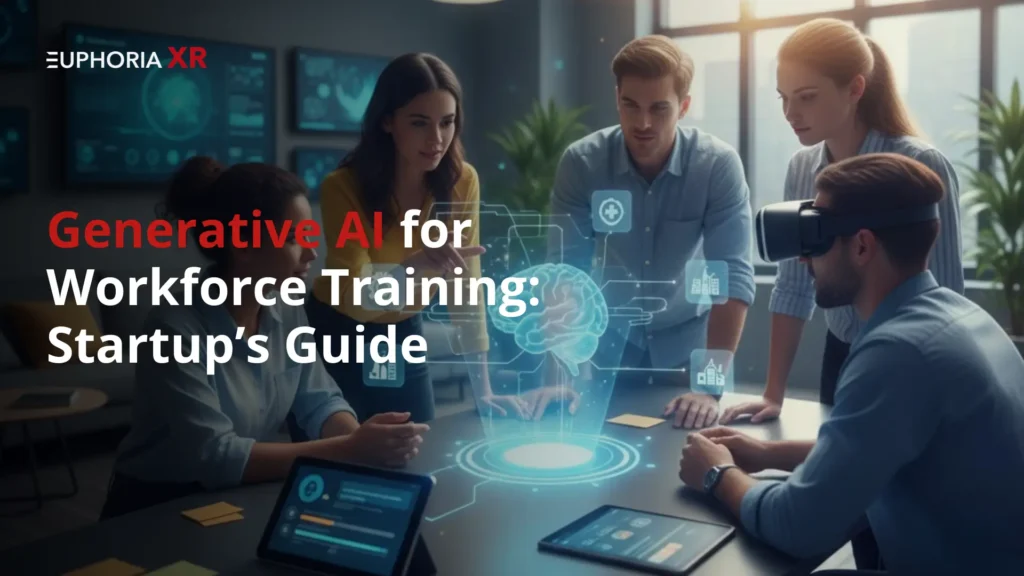Factories are under pressure like never before.
Costs are rising. Skilled labor is becoming scarce. And the demand for faster, cheaper, and higher-quality production keeps on growing.
But here is the heart of the problem:
Most factories are running on systems designed decades earlier. Manual workflows and delayed maintenance combine with inefficient processes to gnaw away at profit-and nobody has time to stop and fix it.
If you are a manufacturer, you must have asked yourself the question:
“How do I keep up without burning out my team or uprooting my entire factory?”
Enter Artificial Intelligence.
AI is not some fanciful high-tech; it is a practical tool used by intelligent factories to automate routine tasks, diagnose problems before they occur, and gain superior outputs with fewer resources.
Most importantly, you do not need millions to kick-start one.
In this article, we will go deep into AI in manufacturing and how to set yourself up to fulfill your dreams.
What is Artificial Intelligence (AI) in Manufacturing?
Artificial intelligence in manufacturing makes it possible to use intelligent machines and systems that can learn, predict, and improve processes without the direct intervention of humans. The AI systems obtain data from sensors, production lines, and even the supply chain to make wiser and faster decisions than even the best human methods could yield. They accomplish their goals, such as making the operation safer, less costly, and resulting in better quality products, without the extra manpower.
Real-World Use Cases of AI in Manufacturing
Predictive Maintenance
The analysis of sensor data by AI tools enables the anticipation of device defects to prevent equipment breakdowns. The system alerts users to potential equipment failure just as a vehicle emits warning lights before a breakdown occurs. Early detection of small issues through this system helps both save expenses and prevent equipment failures that might cause unexpected shutdowns. The implementation of predictive maintenance through Deloitte reports gives manufacturers a 25% drop in maintenance expenses and a maximum possible reduction of 70% in unexpected malfunctions.
Digital Twin Technology
A virtual duplicate of machines or production lines functions the same as physical equipment. That’s a Digital Twin. Engineering professionals employ this system to assess concepts and conduct damage simulations while performing maintenance solutions directly to the operating production line. Digital experimentation through testing and system improvement becomes easier and safer when using this method at lower total costs.
Cobots (Collaborative Robots)
Cobots differ from conventional industrial robots by having features that let humans operate together without needing protective cages. Operating machines for lifting or welding and assembly work provides employees time to concentrate on tasks which need creative thinking or decision-making capabilities. Operations become more efficient through the integration of cobots which neither substitute human workers nor work best in flexible or small-batch manufacturing environments.
Generative Design
The AI-driven generative design software generates numerous product design possibilities that reach hundreds to thousands of potential solutions. Users can achieve their goals by providing their specifications of materials with defined constraints. Thankfully, AI generates optimized design options that human designers never could achieve independently. These technological advances speed up research and development operations, along with creating products that are stronger and lighter, and cheaper than traditional designs.
Factory in a Box
Operational independence defines this portable factory equipment because its AI controlling function works through easy setup procedures. Relocate and deploy this device at any time to industrial or crisis sites or when instant manufacturing is required. A complete set of sensors and robotics that operate under continuous AI monitoring allows the unit to produce refined products across any site.
Custom Manufacturing
AI allows personalized manufacturing to operate at large production volumes. Artificial Intelligence systems evaluate customer information to modify industrial automatons resulting in adjustments during production for various products without termination. The fast-changing consumer preferences within fashion as well as automotive and electronic sectors find great value from this technology.
Automated Quality Control
AI-based cameras and image recognition platforms systematically monitor production levels to detect product failures in current operations. These systems have the capability to detect subtle signs of defects such as minute breaks together with misalignment issues as well as color inconsistencies beyond human visual capability. AI monitoring ensures that products with fewer defects reach the customers while maintaining consistent quality standards for every single unit.
Intelligent Supply Chain Management
AI technology enables both route optimization and supply chain supplier recommendation features by foreseeing delivery delays and proposing backup suppliers to replace non-functional suppliers. Through a process of continuous learning, it processes established patterns such as environmental conditions and industry events to optimize production flow. Organizations that implement AI technologies in their supply chain operations can achieve increased operational efficiency by 20%.
Inventory and Energy Management
Through its tracking system, AI determines levels of inventory alongside usage speed metrics. The system determines whether the supply should decrease or increase through the recommendation tool. The system controls energy consumption by recommending modifications for managing both power reductions during low-demand times and sustainable machine operation.
Document and Product Search
Hundreds or even thousands of documents, including compliance papers, design specifications, and manuals, constitute the typical documents handled by manufacturers. Natural language processing enabled by AI systems permits instant search capabilities through technical documents, which saves engineers and operators many operational hours every day.
Are you prepared to advance your production operations?
Begin small with AI and see results in a matter of weeks, not months.
Six Key Benefits of AI in Manufacturing
Efficient and Safe Operations
Artificial Intelligence performs automation of routine tasks and difficult duties to lower the possibility of workplace accidents. Machines operate autonomously while adjusting and controlling operational parameters to maintain efficiency, together with operational security.
Smart Supply Chains
Real-time supply chain analysis through AI systems enables companies to handle delays and shape demand forecasts as well as design optimal delivery routes. The system proposes substitute suppliers to customers when supply issues arise. The outcome is indeed fewer disruptions and higher customer satisfaction.
Proactive Maintenance
Manufacturers now operate beyond just emergency or reactive maintenance. AI systems identify equipment failure warnings and then send alerts to staff members ahead of breakdown events. The system maintains operations by alerting teams ahead of time, which thus extends both the equipment’s lifespan, reduces production time and costs.
Automated Quality Checks
Detection systems integrated with artificial intelligence track production line defects during operation which produces better results than manual inspections. The implementation of this technology leads to higher product excellence while minimizing costly errors as well as product waste.
Faster Product Innovation
AI tools consisting of generative design and rapid prototyping enable manufacturing operators to speed up their new idea testing process. AI helps companies reach the market faster by shortening their development period, which results in entering competitive markets more quickly.
Workforce Empowerment
Artificial Intelligence transforms labor force capabilities into performance excellence. The combination of artificial intelligence insights enables staff to transition from low-value manual operations into more valuable positions while making better strategic choices. Team members demonstrate greater involvement and technical expertise in digital systems through proper training programs.
Make a sufficient task and streamline your business operations, ready to “CONNECT” Hire AI Developer
The Evolution and Current State of AI in Manufacturing
From Rule-Based Systems to Machine Learning
Industrial operations during the previous era operated based on definitive if-then command structures. The modern AI systems use data inputs to learn and develop through time-based processes. These systems implement instructions but simultaneously enhance their operations.
Real-Time Sensor Data and AI Analytics
The technology landscape of modern times includes machines equipped with numerous sensors. The system collects information from sensors that AI programs analyze to perform performance evaluations and issue predictions before making immediate decisions. The implementation gives machines intelligence that operates through their ability to see.
Flexible, Reconfigurable Factory Layouts
Through modular factory setups, AI enables flexible design changes, which prevent extensive adjustments when introducing new product lines. Factories experience quick changes because machine reprogramming, along with automated reallocation capabilities, enable rapid production line adjustments.
Autonomous Systems in Planning and Execution
Production scheduling, together with workflow management and supply order placement, have become automated processes through AI technologies. Autonomous systems eliminate human mistakes and maintain uninterrupted operations across every hour of the day.
AI in Manufacturing-Adjacent Areas
AI creates substantial changes in factory floors and produces large-scale effects in additional manufacturing domains. AI technology currently supports various activities near production facilities through three essential ways:
Logistics and Warehousing
Real-time tracking of shipments together with route optimization and pre-detailed delay forecasting are all features made possible through AI intervention. AI-empowered robots operate in warehouses to select and organize products faster while removing human mistake during order completion.
Product Lifecycle Management
Artificial intelligence systems track product performance throughout their entire operational lifespan, beginning from the factory exit. Through analyzing usage patterns, AI systems make product improvements while they compute when maintenance will be needed and pinpoint frequent breakdown points to advance the next version.
Procurement and Vendor Analysis
Selecting appropriate suppliers stands as one of the most vital decisions in production operations. AI technology enables procurement teams to decide on vendors along with making more effective choices for speed and budget while monitoring performance and delivery times and pricing trends and risk elements.
Uncertain about where to begin using AI in manufacturing? We will walk you through it.
Becoming an AI-Ready Manufacturer
You are among many who seek guidance about how to introduce AI operations. A step-by-step approach exists to enable manufacturers in their AI implementation journey without overburdening technological infrastructure or employees.
Steps to Implement AI
Your first step should involve selecting the most critical issues like maintenance delays and product defects and inventory problems before choosing established AI solutions. Having a well-defined strategy prevents both tool dispersal and pointless repetition of work efforts.
Starting with Low-Risk Pilots
The complete automation of processes is not required from the very first day of implementation. Select an area of operation consisting of quality control or energy utilization to conduct a minimal testing program. Measure the results and implement lessons learned for the planned increase of successful methods.
Workforce Upskilling
To achieve AI success, one must ensure that their people learn to utilize these benefits. Your organization should provide fundamental and practical training sessions to its workforce teams. AI dashboards and sensors that frontline workers operate become effective when you give them proper direction, which results in increased staff morale.
Partnering with AI Vendors
The need to develop everything from the beginning should be eliminated. Choose AI technology providers who excel in your sector since they will help you through every step from planning to implementation.
Challenges in Adopting AI in Manufacturing
The full potential of artificial intelligence exists despite manufacturing companies facing various obstacles during implementation.
Lack of High-Quality Training Data
The precision of AI results depends on high-quality training data because poor or incorrect data renders the system unreliable. Educating AI becomes difficult because numerous industrial facilities still maintain handwritten records through separate system functions.
Integration with Legacy Systems
Modern manufacturing equipment along with standard software applications cannot communicate in the artificial intelligence language. Connecting contemporary equipment with traditional infrastructure generally needs special adaptations or equipment replacements that diminishes the speed of implementation.
Workforce Upskilling and Resistance
AI generates concerns about job replacement among numerous work teams. Employees tend to resist new systems and experience frustration when there is no proper communication with training available. Engineering staff members need digital confidence at an equal level of importance to technological solutions.
Explainability and Trust
Staff members must have full explanations about the reasons behind AI decisions, especially when it alters production parameters. People develop reservations about AI because they lack a clear understanding of its functioning, especially when it handles quality control and safety applications.
Cost of Deployment
AI isn’t always cheap. Distribution of financial resources for hardware and software components together with employee training creates a significant initial challenge for vendors who operate in the small to mid-size manufacturing sector. When looking at the long-term financial return on investment companies typically find that the initial expenses become negligible.
Future Trends: How AI Will Transform Manufacturing
Manufacturers will encounter new possibilities through the transformation brought by Artificial Intelligence in the upcoming years.
Smart manufacturing continues to develop rapidly, and its upcoming phase is now visible in both the near and distant future.
Self-Optimizing Factories
Manufacturing facilities will transition toward operatorless systems that run automated production sequences while finding performance flaws together with making autonomous improvements.
AI-Led Factory Planning and Simulation
AI technology will run simulations that model entire production lines before equipment installation to enable manufacturers optimize production layouts as well as workflow plans and production personnel requirements for highest efficiency.
Edge Computing for Real-Time Decisions
Edge AI directs on-site analysis through data processing that does not require transmissions to the cloud, followed by delayed responses. Machines equipped with this technology respond immediately to technical equipment problems together with safety matters and shifting market needs.
AI-Supported Sustainable Manufacturing
The implementation of AI has progressively established itself as an indispensable technique for decreasing the environmental effects of manufacturing, which enables businesses to achieve their sustainability objectives.
Are you searching for a dependable AI development company to pursue smart manufacturing goals? We assist you from concept to realization.
Final Thoughts!
AI in the manufacturing realm is a transformation, not merely a trendy notion. Whether you run a small factory or a global operation, adding AI technologies to your processes can enhance efficiency, improve the quality of products being manufactured, reduce costs, and strengthen workers.
Start small. Focus. And lay the groundwork for smartness, the factories of tomorrow have already arrived.
Frequently Asked Questions FAQs?
How is AI used in manufacturing today?
AI is employed for predictive maintenance, quality control, supply chain optimization, design automation, and robotics.
What are the top AI technologies in factories?
Digital Twins, Machine Learning, Cobots, Computer Vision, Natural Language Processing, and Generative Design.
Can AI replace human workers in manufacturing?
Rather, AI supplements the human worker to carry out monotonous tasks and assists in complex decision-making.
What’s the ROI of AI in industrial settings?
Cost savings, downtime reductions, reductions in production time associated with other forms of industrial automation, and reductions in defect rates have all been reported by many manufacturers. ROI is usually on an upward trajectory.
What is predictive maintenance in manufacturing?
Basically, it is an AI-based system that predicts when a machine is going to fail so that it can be serviced before the problems actually happen, thereby preventing unplanned downtime.















